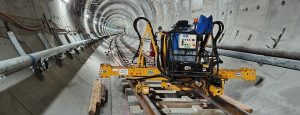 The first kilometre of Forrestfield-Airport Link track has been laid near Redcliffe station, following the final breakthrough near Bayswater and completion of tunnelling works in April.
The first kilometre of Forrestfield-Airport Link track has been laid near Redcliffe station, following the final breakthrough near Bayswater and completion of tunnelling works in April.
“Tracklaying is one of the final major events on the construction of a rail line. It’s an exciting milestone for this AUD 1.86 billion [USD 1.33 billion] project, with more than 2,400 tonnes of Australian-made steel being prepared. This project continues to provide opportunities for local businesses, with WA company Melchor recently announced as the builder of the multistorey car park at High Wycombe station,” Mark McGowan, the prime minister of Western Australia, said.
Martinus Rail, under contract with Salini Impregilo-NRW joint venture, will use more than 2,400 tonnes of Australian-manufactured steel in the tracklaying process, with around 40 km of rail needed to form the track in each tunnel, tie-ins at Bayswater and stowage at High Wycombe.
The rail started out as 27.5 metre pieces of steel before being flash-butt welded into giant 220 metre strings. Multiple teams work simultaneously to weld lengths of rail, transport and precisely lay the rail and sleepers to form the skeleton track in the tunnels, then pour the concrete that finishes the slab track.
The Forrestfield-Airport Link will see 8.5 km of new rail of which 8 km are to be laid into tunnels, served by three new train stations.
The work is also underway to prepare for the installation of the overhead line equipment and the complex systems for communications and signalling.
In 2016 Salini Impregilo-NRW joint venture was awarded the AUD 1.176 billion (USD 843.8 million) contract for design, construction and a ten-year maintenance period.
The Forrestfield-Airport new line is an extension of the Midland Line and when completed in 2021, it will offer efficient transport services linking Perth’s eastern suburbs, capital’s CBD and the airport.
By 2022, the new line’s ridership will reach 20,000 passenger daily trips, increasing to 29,000 daily trips by 2032.
Share on:



